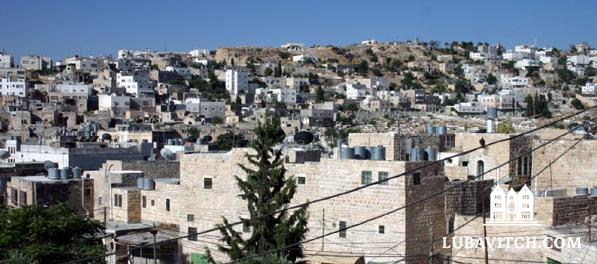(lubavitch.com) Friday, 17 Av, corresponding this year to August 7th, marks the 80th anniversary of the Hebron massacre.
On that fateful day, thousands of bloodthirsty Arabs carrying knives, hatchets and pitchforks rampaged through the streets of Hebron hunting Jews for slaughter. With cries of "Slaughter the Jews” and “Allahu Akbar,” the mob broke homes, tortured, raped and murdered men, women and children.
Benzion Gershon, a pharmacist at the Hadassah hospital, known throughout the region for helping both Jews and Arabs, was tortured and murdered after being forced to watch the mobs rape and butcher his daughter. A total of 67 Jewish men, women and children were murdered. Scores more were injured and raped.
The survivors escaped to Jerusalem, and for the first time in hundreds of years, Hebron was empty of Jewish life. In 1968, after Israel’s victory in the 6 day war, Jews were allowed to return to Hebron.
History records a Jewish presence in Hebron from the time of Abraham, approximately 3800 years ago. It was specifically in Hebron that Abraham purchased land to use as a burial plot for his wife Sarah, himself and his descendants. The Jewish Patriarchs and Matriarchs, Abraham, Isaac, Jacob, Sarah, Rebecca & Leah are buried in Hebron.
Some 800 years later, King David established his capital in Hebron: “And it came to pass afterwards that David inquired of G-d, saying, shall I go up into any of the cities of Judea? And G-d said to him, go! And David said, Where shall I go to? And He said: To Hebron!”
In 1819, Rabbi Dovber of Lubavitch, son of Rabbi Schneor Zalman of Liadi sent a group of followers led by Rabbi Shimon Shmerling to establish a Chabad community in Hebron. Rabbi Dovber acknowledged the dedication this move required, and blessed Jews who chose to live in Hebron
Rabbi Dovber himself later purchased a synagogue next to the Avraham Avinu Synagogue to personally participate in building Hebron's Jewish Community.
A second group of Chabad Chasidm immigrated to Hebron during the years 1840-1845. The group included Menashe Chaikin, Rabbi Ya’akov Slonim and his wife Menucha Rachel, daughter of Rabbi Doveber.
Menucha Rochel Slonim became a strong figure in the Hebron Jewish community, noted for her wisdom and piety. She remained a community leader until her death in 1888.
During the 1929 massacre, almost the entire Slonim family was killed, save a one year old child named Shlomo. Since then, no child born in Hebron was given the name Menucha Rochel.
That is, until August 1st, 2009, when Chabad representatives Rabbi Danny and Batsheva Cohen named their newborn daughter at the Cave of Machpela.
In recent years, the Cohen's passionate leadership has brought a lively revival to Chabad of Hebron enjoyed with a host of educational, religious and social services programs and activities.
Eighty years after the massacre, a circle has closed with the naming of baby Menucha Rochel, by her parents, dedicated to reviving the memory and inspiration of this legendary woman of Hebron.
{}

Be the first to write a comment.